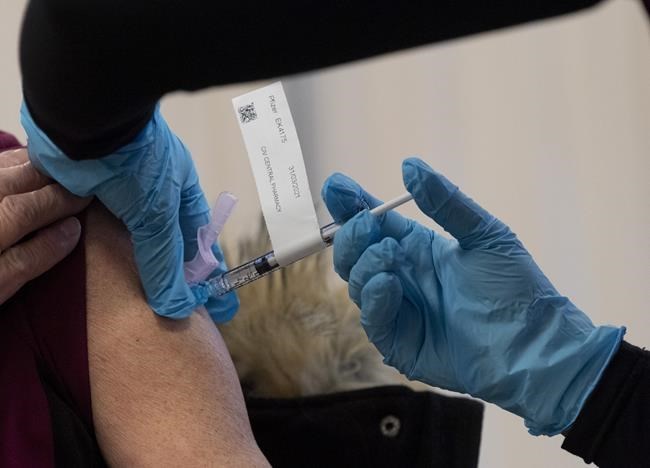OTTAWA — Prime Minister Justin Trudeau tried to calm anxieties over COVID-19 vaccines Friday by reporting that the CEO of Pfizer is promising Canada's deliveries will be fully restored in three weeks.
Trudeau spoke to Albert Bourla by phone Thursday evening, a week after the company informed Canada its deliveries of COVID-19 vaccines were going to be drastically cut over the next month while the company expands its production facility in Belgium.
"The next few weeks will be challenging when it comes to deliveries," Trudeau said Friday.
"That said, Dr. Bourla assured me that hundreds of thousands of Pfizer doses will be delivered the week of Feb. 15 and in the weeks to follow."
Canada is getting only one-third of its promised doses between Jan. 18 and Feb. 7, including none next week. Deliveries the week of Feb. 8 aren't yet confirmed.
Trudeau said Canada will be caught up to its delivery schedule by the end of March, with all four million promised doses delivered by then.
He said there will be enough delivered from Moderna and Pfizer by September to vaccinate all Canadians who want it.
"We’re working around the clock to get as many vaccines as we can, as fast as we can," he said. "It’s what I’m thinking about when I wake up, when I go to bed, and every hour in between."
Gary Kobinger, a vaccine expert and director of the Research Centre on Infectious Diseases at Université Laval in Quebec City, said this week if we can get half the population immunized against COVID-19, it will start to have a real impact on the pandemic, but the magic number to see the spread start to plummet is 70 per cent.
With the two vaccines it has approved, and the delivery schedules promised from Pfizer and Moderna, Canada won't get enough doses to get to 50 per cent until after Canada Day. Children have also not yet been approved to get any vaccine, with trials on kids as young 12 underway now, and those as young as five expected to start in the spring.
Ashleigh Tuite, an infectious disease epidemiologist at the University of Toronto, said the month-long delay in doses isn't going to affect herd immunity because Canada wasn't going to be anywhere near herd immunity by the middle of February even on the original vaccine delivery schedule.
But she said on an individual level, delaying the vaccination of highly vulnerable people can have an impact, particularly at a time when we have record numbers of cases and "raging epidemics" in long-term care homes.
"If you delay the time that it takes for the vaccines to get into those people's arms, you're delaying the ability to protect those people from getting infected and from having bad outcomes," she said. "So it does have an impact."
While COVID-19 can cause severe illness in anybody, the risks to people over the age of 60 are far greater overall. Health Canada reports that as of mid-January, people over the age of 60 account for about one-fifth of the total cases of COVID-19, but almost three-quarters of all hospitalizations, two-thirds of admissions to intensive care, and 96 per cent of deaths.
In Ontario alone since Jan. 1, 550 long-term care residents and two workers have died of COVID-19. There are 252 ongoing outbreaks in long-term care homes in Ontario, and 164 outbreaks in retirement residences.
Fears about future delivery delays grew Friday, when AstraZeneca warned European nations initial deliveries of its vaccine would be smaller than expected because of production issues.
Johnson & Johnson warned officials in the United States that it was about two months behind schedule producing doses of its vaccine.
Both companies have applied for approval of their vaccines in Canada but are still in the midst of final clinical trials and the reviews are not complete. It's expected both could be approved for use here by early spring.
Health Canada did say this week that provincial vaccine workers were doing an "extraordinary" job preventing many doses of precious COVID-19 vaccine from going to waste.
Canada has received more than 1.1 million doses of COVID-19 vaccines from Pfizer-BioNTech and Moderna since mid-December, and has now given at least one dose to more than 767,000 people.
A spokeswoman says "wastage has been very minimal" and well below initial estimates.
Before the vaccination campaign began, there were concerns that as many as one-fifth of the doses delivered to Canada could end up being wasted due to intense cold-chain requirements and the complexity of distribution.
The federal department did not provide statistics but said provinces and territories are reporting their experiences and waste has not been a notable problem thus far.
Both vaccines have to be kept frozen, but the Pfizer-BioNTech vaccine is particularly delicate and must be stored at temperatures below -60 C until just before it is used.
This report by The Canadian Press was first published Jan. 22, 2021.
Mia Rabson, The Canadian Press



